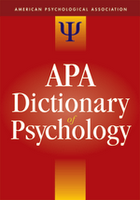
I just received my copy of the new APA Dictionary of Psychology, a reference book that should probably be on the desks of most psychology academics and scholars. As a coauthor of the Woodcock-Johnson III battery, I was pleased to see that the WJ was included in the dictionary. Below is the WJ entry, as well as the definition of "intelligence."
- Intelligence - "the ability to derive information, learn from experience, adapt to the environment, understand, and correctly utilize thought and reason. There are many different definitions of intelligence, including an operational one, proposed by Edwin Boring, that intelligence is what is test by intelligence tests. There is currently much debate, as there ha been in the past, over the exact nature of intelligence.
- Woodcock-Johnson Psychoeducational Battery - "an assessment, now in it's third edition, that measures cognitive ability and academic achievement in children, young people, or adults. The tests of cognitive ability produce a full-scale intelligence score and determine strengths and weaknesses of information processing. The tests of academic achievement assess abilities in reading, written language, mathematics, and knowledge. They also asses basic skills in each of these areas and the level of application of those skills by the person being assessed. This battery is one of the main diagnostic tools used to evaluate a student for specific learning disabilities. Tes results on the cognitive portion, when combined and compared with the results of the achievement portion, reveal the learning style of a student who may have a learning disability, documented by a statistically significant numerical difference between actual performance and cognition potential."
Technorati Tags: psychology, educational psychology, neuropsychology, school psychology, special education, education, dictionary, APA, American Psychological Association, cognition, cognitive, intelligence, IQ, IQ testing, Woodcock-Johnson, WJ, WJ III
powered by performancing firefox
